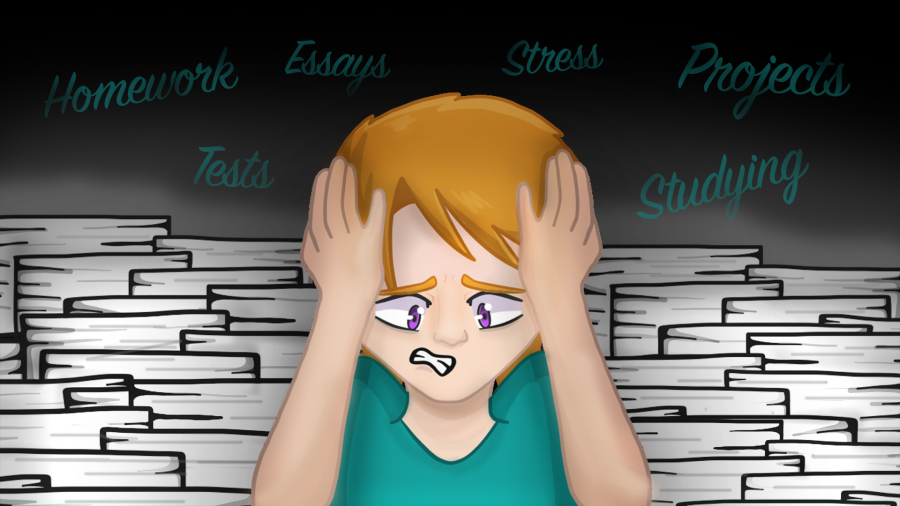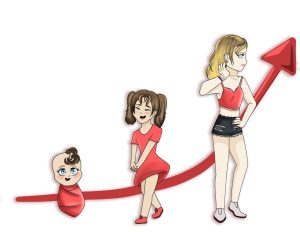Quantity of school work takes away from students’ time for self-care
The mental health of students is negatively impacted by the amount of school work they are assigned. Illustration by Julia Landy
February 3, 2021
Any deliberate action taken to care for your own physical, mental or emotional health can be considered an act of self-care. Whether it’s making sure you eat enough food, get enough sleep, practice positive thinking or take the time to do something you enjoy, it is proven that partaking in self-care reduces your own risk of anxiety, depression, fatigue and other physical and mental disorders.
The vast majority of students’ days are taken up by the six hours of instructional time between 7:40 a.m. and 2:40 p.m. Additionally, most students spend many hours of their afternoons and nights completing assignments and studying for upcoming tests.
With almost all hours of the day focused on their academics, many students are unable to find sufficient time to take care of themselves. The constant stress combined with the limited time for personal activities seems to have taken a negative toll on the well-being of students at Marjory Stoneman Douglas High School.
217 MSD students were surveyed about their self-care habits. Two of the questions asked include: “Do you feel that there is something getting in the way of you practicing self-care?” and “… please specify what you think is hindering your self-care practice.” Students were able to select more than one of the six options provided, which included: “lack of time,” “lack of money,” “lack of resources/access,” “lack of knowledge,” “lack of motivation” and “other,” with a space to specify any other hindrances.
62% of the respondents reported that “lack of time” prohibited their self-care. 26 students chose to fill in their own answers, of which 81% reported having a school-related hindrance such as constant stress over tests, studying, essays, projects or assignments. They further stated that their teachers assigned work with little to no regard for the students’ personal lives or feelings. Students anonymously stated that their teachers gave them work as if said teacher’s class was the only one they had, or the only class that mattered.
“I honestly think my school workload is what always gets in the way of practicing self-care,” senior Lexie Sealy said. “My therapist, every week, gives me a new suggestion of a hobby to take part in, but oftentimes, even in a single week, I can’t find spare time to do it because I am so busy studying for three tests, writing an essay and doing my math homework.”
The increased workload can prohibit students from taking time off to participate in activities that they enjoy. Additionally, the excess stress and decreased spare time can also prevent students from getting the amount of sleep needed to feel good and perform well. According to the Centers for Disease Control and Prevention, it is recommended that people aged 13-18 get anywhere from 8-10 hours of sleep each night. However, 47% of MSD students reported getting six or less hours per night. Sleep deprivation causes increased irritation, decreased concentration and depressive disorders, all of which are very harmful, especially to high school students.
“I can never sit down and relax when I have all these assignments due. In the morning, I have to wake up extra early to get dressed and eat breakfast, so I get 6 hours [of sleep] at most,” freshman Elise Gonzalez said. “The stress put on me [by] the [End-of-Course exams] is beyond any normal amount. I truly want there to be [a] change in the system so the next generation won’t have to worry about being depressed or having to stay up late at night to finish homework, [just to] wake up early the next day [and] do it all over again.”
According to the Centre for Addiction and Mental Health, high amounts of prolonged stress and pressure can lead to mental illness. In turn, that stress can negatively affect students academically, leading to even more stress, and continuing the cycle.
Built-up stress over prolonged periods of time can also cause burnout in both teens and adults. Teenagers, however, often do not have the coping skills necessary to combat burnout, causing them to have trouble staying on task and motivated.
Symptoms of burnout may include lack of motivation, lack of concentration, lack of inspiration exhaustion, frequent mood swings, loss of confidence, trouble keeping on task and feelings of anxiety or depression. The overwhelming effects of burnout are often very difficult for high school students to manage, harming their academic performance. According to a study of 11th grade students conducted by New York University, 49% of students report feeling a great deal of school-related stress on a daily basis.
To combat burnout, the University of the People recommends a variety of self-care techniques including: participating in enjoyable activities, spending time in nature, exercising, socializing and goal setting. In general, self-care is deemed as an excellent way to minimize stress and improve mental health, yet the daily routine that students must carry out sometimes hinders its effectiveness.












